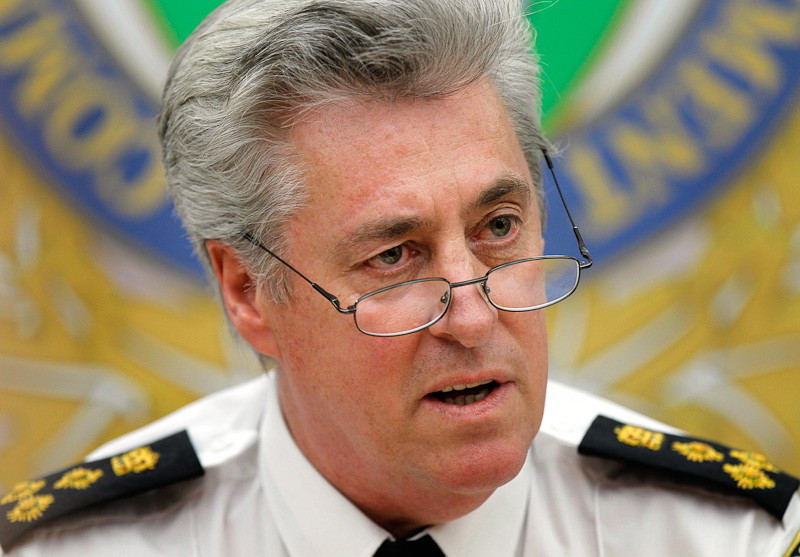Chief concerns
Soon-to-be-retired WPS Chief of Police McCaskill looks back on term, critics weigh in
As Keith McCaskill prepares to leave his post as Chief of the Winnipeg Police Service, the time has come for citizens and officers alike— as well as McCaskill himself— to assess the top cop’s five-year legacy.
McCaskill, who has served on the city’s police force since 1976, began his term as chief in 2007 and announced his retirement in March of this year.
He will officially leave office on Dec. 9, when his replacement— still to be announced— will assume his or her leadership duties.
“Have we accomplished everything (we set out to do)? No,” McCaskill said.
“I think we’ve gone a long way toward reaching our goals, but I think there’s lots more to be done, still— and there always will be.”
According to McCaskill, these objectives included more efficient deployment of police resources, increased safety for officers on the street and better relationships between police and the public.
“We needed to build more bridges with the community— all communities, but particularly the aboriginal community,” he said.
McCaskill also noted a number of significant “exciting” changes to policing legislation that have occurred over the course of the past half-decade, including the launch of a provincial police commission, the passing of the Police Act (which will mandate a civilian oversight body for complaints against police in place of the current in-house investigative process), and the appointment of a police board, which he says will incorporate greater civilian input into the service’s decision-making process than the current system.
“This is a very different governance model than what we’re used to,” he said. “I’ll certainly be watching with a lot of interest.”
McCaskill, however, is not without his critics.
James Jewell, a former WPS homicide unit leader, became involved in a highly public confrontation with the service in 2011, after he was abruptly transferred and replaced.
Days before, Jewell had raised concerns with McCaskill about the force’s transfer policy and its effect on the homicide unit, according to media reports.
Jewell filed a grievance with the Manitoba Labour Board, which ruled the transfer was made in “bad faith” and violated the collective agreement.
Jewell said though intelligent and approachable, McCaskill drifted from his front-line roots.
“After a five-year reign, I have to confess that the overall sense I get from the officers I previously supervised and associate with is that Chief McCaskill has been somewhat of a disappointment,” Jewell said in an email.
“In many circles, officers believe that, somewhere along the road, Chief McCaskill completely lost touch with the front lines.
“He became a politician.”
Alex Spence, a member of Winnipeg CopWatch— a collectively run organization that aims to raise awareness of issues such as police brutality— said the group has not taken issue with McCaskill specifically, aside from one instance when they brought him reports of unlawful camera seizures and received no response.
Spence said that in her experience, changes in higher-level leadership tend to have only a “minimal effect” upon systemic policing-related issues.
When asked if, in hindsight, he would have made different choices during his tenure, McCaskill was clear in expressing he made his share of mistakes.
“You do the best you can with the information that you have, and sometimes it doesn’t work out the way you wanted it to, unfortunately,” he said.
McCaskill has received recent criticism over Project Devote— a joint task force initiative involving both the WPS and RCMP assigned to investigate eight disappearances and 20 homicide cases involving aboriginal victims, most of them women— as “too little, too late.”
Project Devote is meant to be “a second look with new, fresh eyes” at cases that were already being investigated by police, McCaskill explained.
“We don’t know if (Project Devote) is going to yield any fruit, but it’s important we do it,” he continued. “Homicide— that’s just something we should never, ever skirt resources on. It’s a tragedy when anybody dies or is the victim of an offence.”
According to McCaskill, the real solution to the larger issues that Devote reveals is work at the “front end,” where certain socio-economic groups, aboriginal and otherwise, find themselves in disadvantaged positions.
As for becoming a politician: “It really is a very political position,” he said. “That’s just the nature of the job.”
While the city has yet to name the next Chief of Police, McCaskill expressed that, though he has no official knowledge, rumours within the police service indicate the selection process is likely complete and its outcome will be announced shortly.
Published in Volume 67, Number 2 of The Uniter (September 12, 2012)







